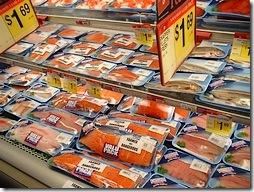 The farmed fish industry may have gotten a bit of a reprieve from all the heat associated with the Frankenfish, apparently UC Davis researchers claim that while farmed fish are responsible for much of the sea lice the fish must navigate through – there’s less evidence those self-same lice are responsible for the collapse of the Pink Salmon population of Western Canada.
The farmed fish industry may have gotten a bit of a reprieve from all the heat associated with the Frankenfish, apparently UC Davis researchers claim that while farmed fish are responsible for much of the sea lice the fish must navigate through – there’s less evidence those self-same lice are responsible for the collapse of the Pink Salmon population of Western Canada.
Those runs have climbed and dropped precipitously in the past, again without explanation. UC Davis scientists continue to shrug about what happened, but the farmed fish induced lice theory gets scrapped.
The new study is the first to analyze 20 years of fish production data and 10 years of sea-lice counts from every salmon farm in the Broughton Archipelago and compare them against 60 years of population counts of adult pink salmon.
The study concludes that farm fish are indeed the main source of sea lice on the area’s juvenile wild pink salmon, but it found no statistical correlation between lice levels on the farms and the lifetime survival of wild pink salmon populations.
The nature of science is a bit unpredictable, so I would wait for corroboration from other sources before speaking definitively on the subject.
What is finite and well defined is how few wild fish are in my supermarket. Instead of a nice fillet that I can inspect I have meat hidden in gaily colored opaque bags announcing themselves as fresh Halibut, Salmon, and Cod – each torn from the icy bosom of untouched Atlantic or Pacific Oceans, yearning to join me at dinner …
… it’s too much like a blind date, and I can’t bring myself to buy any.
As most fellows aren’t the cook and bottle-washer and blind to the trends of supermarket aisles, unable to tell the whether the object is a mango or a dog turd … 95% of all fish* (includes squid, scallops, shrimp, and fish-like substance) for sale are farmed.
Occasionally they’ll have a salmon head or fillet in a transparent wrapper, but almost all of the indigenous white fleshed fish are now opaque wrapped – so you won’t see the acne scars, footprints, or notice it’s still moving … kinda …
Doctors insist anything living in water is nutritious and an important source of Omega-3 oils, but I’ll opt to be cautious and get my oil downstream of that leaking lawnmower in the Bridge Pool, which should be surrogate enough …

And unfortunately if we expect to keep the world’s population fed, we’re likely to rely heavily on farmed fish in the future.
At least until the FDA and the USDA approve Soylent Green. If they haven’t already. I’m sure Soylent Silver (It’s Asian Carp!!! Soylent Silver is made with Asian Carp!!!) is already in the works.
Your readership should be made aware that the main authors are linked to industry and government. I suspect that a rebuttal will be forthcoming.
Yes, hence my warning not to dance a jig quite yet … I am not sure whether the UC Davis fellows might not be in the employ of the farmed fish industry, specifically.
Having a foot in both camps (fishing/biological science) I get kind of twitchy when it is suggested that a scientific finding not to everyone’s (well anglers I suppose) liking is because the authors somehow have ulterior motives. Crap papers do get published no doubt, but generally in crap journals. An “industry sponsored” manuscript sent to a journal as high profile as PNAS would still go through the reviewing scrutiny that a manuscript sent from a bunch of fishermen would have to go through. The authors also have to supply a “conflict of interests statement” where they would have to acknowledge their relationships with industry – which they do and which also seems reasonable. Additionally, the data collection, organization and analysis would have to support the conclusions found and trying to shoehorn in an agenda – to say fish farm generated sea lice aren’t the cause of the 2002 decline – aren’t likely to escape the reviewers unless the data sufficiently supports such a finding. This is not to say that there won’t be a “response to” follow up if other workers in the field feel the authors of this paper have missed something or overstated their case. But reading the paper and looking at the sources suggests to me that the conclusions are a fair punt. It doesn’t get fish farms off the hook at all. Part of the conclusion is that the cause may be due to other disease agents which equally could be farm generated – there just isn’t the data to pursue that line yet.
@eccles…we’ve already seen some scientists’ ulterior motives in the climategate affair…they’re as crooked as they come, with their bloated pensions and (almost) free health care…